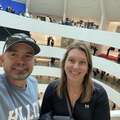Technology Update: The “Forgotten Valve” Gets New Feasibility Study!
By Adam Pick on April 19, 2017
We’ve talked about how the tricuspid valve is often referred to as the “forgotten valve” within cardiac care. At the same time, we’ve also learned that the treatment of tricuspid valve regurgitation is on the rise — either as a stand-alone therapy or combined with a mitral valve procedure.
That said, I was really interested to learn about a new transcatheter technology that is being used in the SCOUT feasibility study to treat tricuspid regurgitation. To learn more, I sat down with Dr. Charles Davidson who is the Clinical Chief of Cardiology at Northwestern Medicine. Here are the highlights from my interview with Dr. Davidson about this new technology.
Pretty neat, right? I guess this is one more piece of evidence that the use of transcatheter technologies is going to continue across the aortic, mitral, pulmonary and tricuspid valves. The possibilities are very, very, very exciting.
Keep on tickin!
Adam
P.S. For the hearing impaired members of our community, here’s a written transcript of my interview with Dr. Davidson about the SCOUT feasibility study.
I’m Charles Davidson; I’m the medical director of The Bluhm Cardiovascular Institute and the Clinical Chief of Cardiology at Northwestern Medicine. I’ve been in practice for about 25 years. I perform catheter based therapies. That would include valve replacement, valve repair, structural heart disease, and coronary angioplasty.
Transcatheter therapy means that you don’t use open heart surgery to take care of the patient’s problem. The sternum is not broken with this therapy. We can do this through plastic tubes that are inserted through arteries or veins in the body. There is no heart-lung machine, and in many of these therapies we do not even use general anesthesia.
The beautiful part of transcatheter therapies is there is faster recovery for the patients. That means shorter hospitalization, quicker ambulation, and more likely to go home rather that to a rehabilitation facility.
Tricuspid regurgitation is leaking in the valve on the right side of the heart that connects the top and bottom of the heart. Tricuspid regurgitation can present with shortness of breath, fatigue, leg swelling, and difficulty in performing your activities of daily living. Tricuspid regurgitation has long-term risks, it can cause the heart to enlarge and particularly the right ventricle to enlarge.
Surgery is often not offered because the risks of surgery often outweigh the benefits, which is why we’re interested in a catheter-based therapy; which will have less risk, potentially, and still provide the benefits.
The SCOUT study is evaluating patients with severe tricuspid regurgitation, who are not doing well on medical therapy. At this point it is a feasibility trial, meaning that any patient that qualifies based on symptoms in anatomy may be treated with this device. It is currently being provided in a limited number of centers in the United States, in order to understand the safety and efficacy of this percutaneous therapy. This device treats tricuspid regurgitation by taking the enlarged opening around the tricuspid valve and making it smaller. In so doing, the amount of leaking that occurs around that valve is lessened.
A feasibility study means that the FDA has approved this technology to be investigated in a limited number of centers to understand the safety and efficacy of the technology. Typically, after a feasibility study is performed, the data will be evaluated, the patient outcomes will be evaluated, and then a pivotal trial will occur. A pivotal trial is typically designed in a randomized fashion, meaning that half the patients will receive the therapy and half will receive some other therapy, typically medical therapy. If the results from the pivotal trial are favorable, they will provide the information that will allow the FDA to approve this therapy for use in the United States.
We look at each patient individually to decide whether surgery, medical therapy, or the latest technology is the best way to treat that patient. We want to be able to provide them all of the treatment options and let the patients and the heart team decide what’s the best way to take care of that patient.
What’s been exciting for me as a physician is that we’re able to help patients in a way that we’ve never been able to help them before. We’ve been able to make them live longer. We’ve been able to improve their quality of life. We’ve been able to really make their families be able to enjoy them more than they have in the past. To be able to treat people that in the past didn’t have good options or their options required long recoveries, now we can actually get them up and around better, live longer. It’s been a great reward as a physician.
|
Karen says on April 23rd, 2017 at 1:26 pm |
|
I was selected by the Mayo clinic in Rochester MN to participate in their early feasibility study of the Edwards FORMA Tricuspid transcatheter repair system. The implant was done 3-30 and I’m scheduled for follow-up on 5-1-17. I feel very fortunate to be at the forefront for this pioneering research and optimistic for my success and continued success for the FORMA device! |
 |










